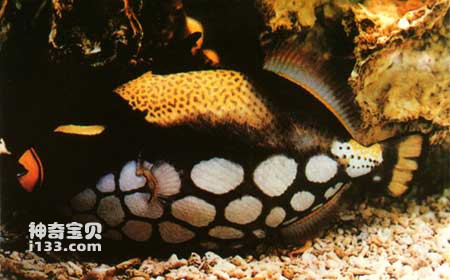In the coral reefs of the South China Sea, where there are many corals, there live some fish with flat sides, degraded abdomen, about 20 centimeters in length, and an appearance that resembles the pufferfish (skinned fish). Because their whole body is covered with hard plate-like thick scales, they are called scale puffers.
The eyes of the scaled puffer fish are located slightly forward in the center of the back of the body. It seems that the head of the fish takes up 1/2 of the entire body. There is a very thick hard spine in front of the first dorsal fin on the back of the body. This thick spine The surface of the hard spines is covered with granular protrusions, and the base of the spines can move back and forth, just like a trigger that can be pulled by a pistol, so fishermen in the South China Sea also call them "trigger fish."

The mouth of the scale puffer fish has hard, sharp wedge-shaped teeth that are very suitable for cutting. In addition, its whole body is covered with hard scales. Some species also have sharp spines or barbs on both sides of the tail peduncle; these morphological structures are very It helps the puffer fish swim through the coral reef and catch food.
The fish's food is stinging sea urchins and starfish that live in coral reefs. In particular, the meat of the spiny sea urchin is the favorite food of the scaly abalone. The whole body of the spiny sea urchin is covered with long spines that are more than 30 centimeters long. The eyes of the scaly sea urchin are located at the back of the head far away from the mouth. It can be said that this ingenious adaptive feature is the result of long-term natural selection. This adaptability allows the pufferfish to avoid being stabbed in the eyes by the sea urchin's spines when preying on them. But it is not easy for the fish to eat this fully armed "ball hedgehog". It needs to use its brains very well and come up with a clever way to win.
The long-spined sea urchin only has no spines around its mouth, which can be regarded as an "undefended" area, but its mouth is located at the bottom. If the puffer fish doesn't come up with a clever trick, it will be impossible to peck it with its mouth. So the pufferfish, which is good at using its brain, sprays water on the sea urchin with its mouth, causing the long-spiny sea urchin to turn its body over under the impact of the water flow. In this way, the "undefended" mouth of the sea urchin is exposed to the attack of the wedge-shaped sharp teeth of the pufferfish. within the range.
animal tags:
We created this article in conjunction with AI technology, then made sure it was fact-checked and edited by a Animals Top editor.